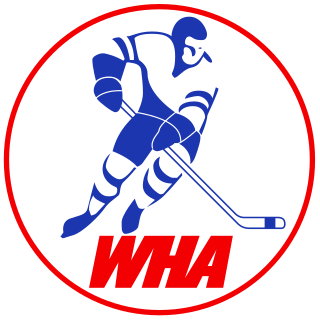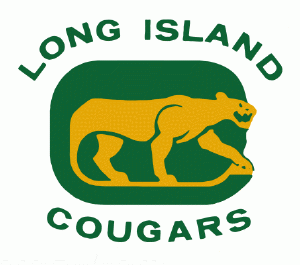Related Research Articles

The World Hockey Association was a professional ice hockey major league that operated in North America from 1972 to 1979. It was the first major league to compete with the National Hockey League (NHL) since the collapse of the Western Hockey League in 1926. Although the WHA was not the first league since that time to attempt to challenge the NHL's supremacy, it was by far the most successful in the modern era.
The Gary L. Davidson Award was given to the most valuable player of the World Hockey Association regular season, from 1973 to 1975. It was named in honour of WHA co-founder Gary Davidson, but for the 1975–76 WHA season, it was renamed the Gordie Howe Trophy in honour of one of hockey's all-time greats; Gordie Howe.
The 1972–73 WHA season was the first season of the World Hockey Association (WHA). Twelve teams played 78 games each. The league was officially incorporated in June of 1971 by Gary Davidson and Dennis A. Murphy and promised to ice twelve teams in various markets around Canada and the United States. The league championship trophy, the Avco World Trophy, was donated by AVCO Financial Services Corporation along with $500,000. The New England Whalers won the first Avco World Trophy.
The 1977–78 WHA season was the sixth season of the World Hockey Association (WHA). Eight teams played 80 games each. The Avco World Trophy winner was the Winnipeg Jets.
The 1973–74 WHA season was the second season of the World Hockey Association, and lasted from October 1973 until the Avco Cup final game on May 19, 1974, when the Houston Aeros, with Gordie Howe, defeated the Chicago Cougars to sweep the series in four games. Twelve teams each played 78 games. The Philadelphia Blazers relocated to Vancouver, becoming the Vancouver Blazers. They were moved to the Western Division and Chicago moved to the East. The New York Raiders were renamed the New York Golden Blades and then moved to Cherry Hill, New Jersey to become the Jersey Knights after just 24 games. The Ottawa Nationals moved to Toronto and became the Toronto Toros. The Alberta Oilers changed their name to the Edmonton Oilers.
The 1974–75 WHA season was the third season of the World Hockey Association. Fourteen teams each played 78 games. The Houston Aeros won the Avco World Trophy for the second straight year in dominating fashion, losing only one time in the playoffs.
The 1975–76 WHA season was the fourth season of the World Hockey Association. After the Baltimore Blades and Chicago Cougars folded, the league stayed at 14 teams by adding the Cincinnati Stingers and Denver Spurs. In addition, the Vancouver Blazers franchise moved to Calgary and became the Cowboys. Midway through the season, the Spurs moved to Ottawa and became the Civics, though the team folded shortly thereafter when the sale of the franchise fell through. The Minnesota Fighting Saints became the second team to fold mid-season when the franchise was not financially successful, despite having a winning record at the time. Theoretically, fourteen teams would play 80 games each, but only twelve teams finished the season, with cancelled games involving the Civics or Saints being rescheduled on the fly, and four of five Canadian Division teams played 81 games, as a result.
The National Hockey League's Smythe Division was formed in 1974 as part of the Clarence Campbell Conference. The division existed for 19 seasons until 1993. It was named in honour of Conn Smythe, who was a longtime owner, general manager, and head coach in the league. It is the forerunner of the NHL's Northwest Division and Pacific Division.
The National Hockey League's Pacific Division was formed in 1993 as part of the Western Conference in a league realignment. It is also one of the two successors of the Smythe Division, though of the current teams, only the Anaheim Ducks, Seattle Kraken and Vegas Golden Knights did not play in the Smythe Division. Due to subsequent realignments, three of the Pacific Division's original teams left the division in 1998 but returned in 2013. The division is the only one in the NHL without any Original Six teams. Due to the COVID-19 pandemic and the resulting closure of the Canada–United States border, all eight teams were transferred into two different divisions for the 2020–21 NHL season. The American-based teams were moved to the West Division, while the Canadian-based teams were placed into the North Division.
The 1976–77 WHA season was the fifth season of the World Hockey Association (WHA). Prior to the season, the Toronto Toros moved to Birmingham, Alabama and became the Birmingham Bulls. The Cleveland Crusaders attempted to move to South Florida, but instead became the short-lived second incarnation of the Minnesota Fighting Saints and folded after playing 42 games. With the death of the Saints, the WHA left the last market it had been sharing with the NHL. The remaining 11 teams finished the season, playing 80 or 81 games.
Gary Raymond Veneruzzo is a Canadian former professional ice hockey player. He played seven games in the National Hockey League (NHL) with the St. Louis Blues during the 1967–68 and 1971–72 seasons, and 348 games in the World Hockey Association (WHA) with the Los Angeles Sharks, Michigan Stags/Baltimore Blades, Cincinnati Stingers, Phoenix Roadrunners, and San Diego Mariners from 1972 to 1977. Veneruzzo was born in Fort William, Ontario.
Barry Graham Legge is a Canadian former professional ice hockey player who played 107 games in the National Hockey League and 345 games in the World Hockey Association. He played for the Winnipeg Jets, Quebec Nordiques, Michigan Stags, Baltimore Blades, Denver Spurs, Ottawa Civics, Cleveland Crusaders, Minnesota Fighting Saints, and Cincinnati Stingers.
The 1974–75 Quebec Nordiques season was the Nordiques' third season, as they were coming off a 38–36–4 record in 1973–74, earning 80 points, however, they failed to qualify for the post-season for the 2nd straight season.
The 1977–78 Quebec Nordiques season was the Nordiques sixth season in the WHA, as they were coming off of a 47–31–3 record in the 1976–77 season, finishing in first place in the Eastern Division. Quebec defeated the New England Whalers, Indianapolis Racers and Winnipeg Jets to win their first ever Avco Cup.
The World Hockey Association general player draft was held over the course of two days, February 12 and 13, 1972, in Anaheim, California. The purpose of the draft was to establish an orderly process through which WHA teams would stock their rosters by the beginning of their inaugural season later that year. As such, players from other professional teams were eligible to be drafted. The draftees were not under any legal obligation to sign with the drafting WHA club: other WHA clubs were prevented from negotiating with the players who had been drafted.
The 1979 NHL expansion, popularly referred to as the NHL–WHA merger, was the culmination of several years of negotiations between the National Hockey League (NHL) and the World Hockey Association (WHA). The result of the negotiations was that the WHA folded, and four of its six surviving teams - the Edmonton Oilers, New England Whalers, Quebec Nordiques, and Winnipeg Jets – entered the NHL as expansion teams who commenced play in the NHL in the 1979–80 season. The agreement officially took effect on June 22; it ended the seven-year existence of the WHA and re-established the NHL as the sole major league in North American professional ice hockey.
The 1976–77 Houston Aeros season was the Aeros' fifth season of operation in the World Hockey Association. The Aeros finished first in the West to qualify for the playoffs. The Aeros would lose in the semi-finals to the Winnipeg Jets.
The 1973–74 Los Angeles Sharks season was the Los Angeles Sharks' second and final season in Los Angeles in the World Hockey Association. The club finished last in the WHA Western Division and missed the playoffs. They moved to Detroit, MI after the season and became the Michigan Stags.

The Long Island Cougars were a minor league professional ice hockey team that played at the Long Island Arena in Commack, New York, from 1973 to 1975. The Cougars were a member of the North American Hockey League, and were runners up for the Lockhart Trophy to the Syracuse Blazers in the 1973–74 season.
The 1974–75 World Hockey Association All-Star Game was held in the recently opened Edmonton Coliseum in Edmonton, Alberta, home of the Edmonton Oilers, on January 21, 1975. The game pitted the East All-Stars, which consisted of players from the four Eastern Division teams, Toronto and Quebec of the Canadian Division, and Michigan of the Western Division, against the West All-Stars, which consisted of players from the four remaining Western Division teams and Edmonton, Vancouver and Winnipeg of the Canadian Division. The West All-Stars defeated the East All-Stars 6–4. Rejean Houle, who scored two goals and assisted on two others for the East, was named the game's most valuable player.